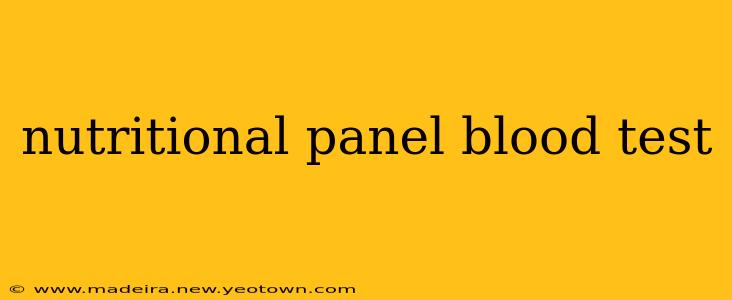Decoding Your Nutritional Panel Blood Test: A Comprehensive Guide
Imagine this: you're sitting across from your doctor, a stack of lab results spread across the desk. Among them, a nutritional panel blood test, a seemingly cryptic document filled with numbers and abbreviations. This isn't just a list of numbers; it's a window into your body's inner workings, revealing the nutritional landscape fueling your health – or potentially hindering it. Let's unravel the mysteries of this vital test, transforming those confusing numbers into actionable insights for a healthier you.
This story isn't about dry facts and figures; it's about understanding your body's unique story, told through the language of your blood. We'll explore the common components of a nutritional panel, explain what they mean, and guide you in interpreting the results with the help of your healthcare professional.
What is a Nutritional Panel Blood Test?
A nutritional panel blood test isn't a single, standardized test. Instead, it's a collection of tests focusing on various vitamins, minerals, and other essential nutrients. The specific components included will vary depending on your doctor's assessment of your individual needs and health concerns. Some common elements include:
- Vitamin D: Crucial for bone health, immune function, and mood regulation. Low levels are incredibly common.
- Vitamin B12: Essential for nerve function, red blood cell production, and DNA synthesis. Deficiencies are particularly prevalent in older adults and vegans.
- Folate (Vitamin B9): Vital for cell growth and development, especially during pregnancy. Deficiencies can lead to serious birth defects.
- Iron: A key component of hemoglobin, responsible for carrying oxygen throughout the body. Iron deficiency is a leading cause of anemia.
- Complete Blood Count (CBC): While not strictly part of every nutritional panel, a CBC often accompanies these tests to assess overall blood health, including red and white blood cell counts.
What does a low Vitamin D level mean?
Low Vitamin D levels, often indicated as a deficiency, are surprisingly widespread. This doesn't automatically mean something is seriously wrong; many factors contribute, including limited sun exposure (especially in northern climates), dietary choices, and certain medical conditions. A deficiency can manifest in fatigue, muscle weakness, bone pain, and even increased susceptibility to infections. Your doctor will work with you to determine the underlying cause and recommend appropriate treatment, potentially involving dietary changes, supplementation, or increased sun exposure (always with appropriate sun protection).
What are the symptoms of Vitamin B12 deficiency?
Vitamin B12 deficiency can manifest in a wide range of symptoms, often subtle at first. These can include fatigue, weakness, constipation, tingling or numbness in the extremities, pale skin, shortness of breath, and even cognitive difficulties like memory problems or confusion. The severity of the symptoms depends on the extent and duration of the deficiency. Again, your doctor will be essential in diagnosis and treatment, which might involve dietary adjustments or B12 supplements (often administered via injection for more effective absorption).
How are iron levels tested?
Iron levels are commonly tested by measuring serum ferritin, a protein that stores iron in the body. Other tests might also be conducted, like serum iron and total iron-binding capacity (TIBC), to get a complete picture of your iron status. Low iron levels can lead to iron-deficiency anemia, characterized by fatigue, weakness, pale skin, shortness of breath, and headaches. Treatment often involves dietary changes (consuming iron-rich foods) and, if necessary, iron supplements.
How can I interpret my nutritional panel results?
This is crucial: do not attempt to interpret your nutritional panel results on your own. These tests provide valuable data, but understanding their significance requires the expertise of a healthcare professional. Your doctor will consider your individual health history, lifestyle factors, and the results of your blood tests to provide personalized recommendations and address any underlying health concerns. They'll help you understand what the numbers mean in the context of your overall health and create a plan for improvement, which might involve dietary adjustments, lifestyle changes, or supplementation.
What should I do if my nutritional panel shows abnormalities?
If your nutritional panel reveals abnormalities, don't panic. This is simply a starting point for a conversation with your doctor. They will assess the results, considering other factors in your health, and guide you towards appropriate next steps. This might include further testing, dietary modifications, lifestyle adjustments, or supplementation. Remember, your healthcare provider is your partner in achieving optimal health.
This journey to understanding your nutritional panel blood test is a collaborative one. By partnering with your doctor and embracing the knowledge gained, you can take proactive steps to nurture your body and achieve optimal well-being. Remember, the numbers on your report are not just numbers; they're a story – your story – waiting to be understood and used to fuel a healthier, happier you.

